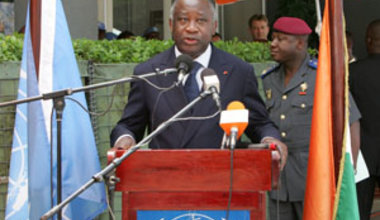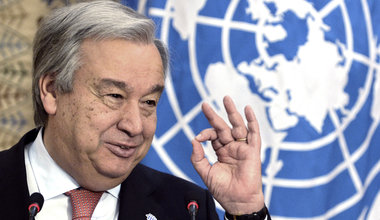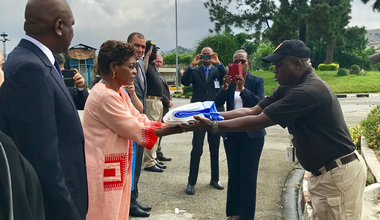President Gbagbo participates in International Day of Peacekeepers at UNOCI

Abidjan, 29 May 2009... Many senior Ivorian officials, led by President Laurent Gbagbo, and members of the diplomatic corps participated in the celebration of the International Day of Peacekeepers at the headquarters of the UN Operation in Côte d'Ivoire (UNOCI) in Abidjan on Friday 29 May.
« Your presence here today bears witness to the excellent state of cooperation between the Ivorian people and the United Nations, » the Special Representative of the United Nations Secretary-General for Côte d'Ivoire, Y.J. Choi, stated as he welcomed his guests.
Mr. Choi welcomed the remarkable steps forward made by the Ivorian people on the road to reconciliation." From all evidence, this year will constitute a decisive turning point for the crisis-resolution process," he said, explaining that the two biggest stakes - elections and reunification – were proceeding as everyone expected. He also assured the Ivorian people of the commitment and determination of the international community and UNOCI to accompany the country out of the crisis and towards prosperity.
The Special Representative also delivered the special message issued by UN Secretary-General Ban Ki-Moon for the International Day of Peacekeepers in which the Secretary-General highlighted the important role played by women in peacekeeping operations worldwide. This theme of this year's International Day is: women in peacekeeping, a force for peace
Friday marked the second time that President Laurent Gbagbo attended an International Day of Peacekeepers celebration at UNOCI, the first being in 2006. The Ivorian president seized the opportunity to indicate that the peace process in his country was moving forward and to call on the international community and the UN to continue accompanying it. "Since signing the Ouagadougou Political Agreement, we have been moving forward. Today there are no more political problems, there are financial and technical problems," he said.
« If I have come here, it is to give an update on the situation and to explain to you the nature of the crisis-resolution process in Côte d'Ivoire, » he said, retracing the history of the inter-Ivorian direct dialogue, which, under the facilitation of Burkinabé President Blaise Compaoré, led to the Ouagadougou Political Agreement. He stated that, in the beginning, all the actors in the peace process, including the international community, had been mistaken about the nature of the Ivorian crisis. "It was not a case that could be fixed with UN resolutions," he explained. He highlighted the progress made through the Ouagadougou Political Agreement which, he said, also paved the way for heightened cooperation between Côte d'Ivoire and neighbouring Burkina Faso.
"I am explaining all of this to you so as to facilitate your own task," President Gbagbo said, welcoming the collaboration he enjoyed with the present representatives of the international community. « It is we, Ivorians, who created the crisis situation and it is our duty to end the crisis », he explained. "We are doing so. Help us. Accompany us. »
The celebration of International Day of Peacekeepers was marked in Abidjan by a parade by Blue Helmets and the reading of the names of UN staff who died in the service of peace, in whose honour a wreath was laid by the Ivorian President and the head of UNOCI. President Gbagbo and other Ivorian and foreign personalities also visited stands at which the various sections of UNOCI explained their missions and the activities they carry out in favour of the peace process.
The United Nations established International Day of Peacekeepers to pay homage to all the men and women who serve the cause of humanity in UN peacekeeping operations worldwide and to honour the memory of those who have lost their lives doing so. It commemorates the 29th of May 1948, the day when the first UN peacekeeping mission began in Palestine with a group of unarmed military observers.
 UN
UN United Nations Peacekeeping
United Nations Peacekeeping








